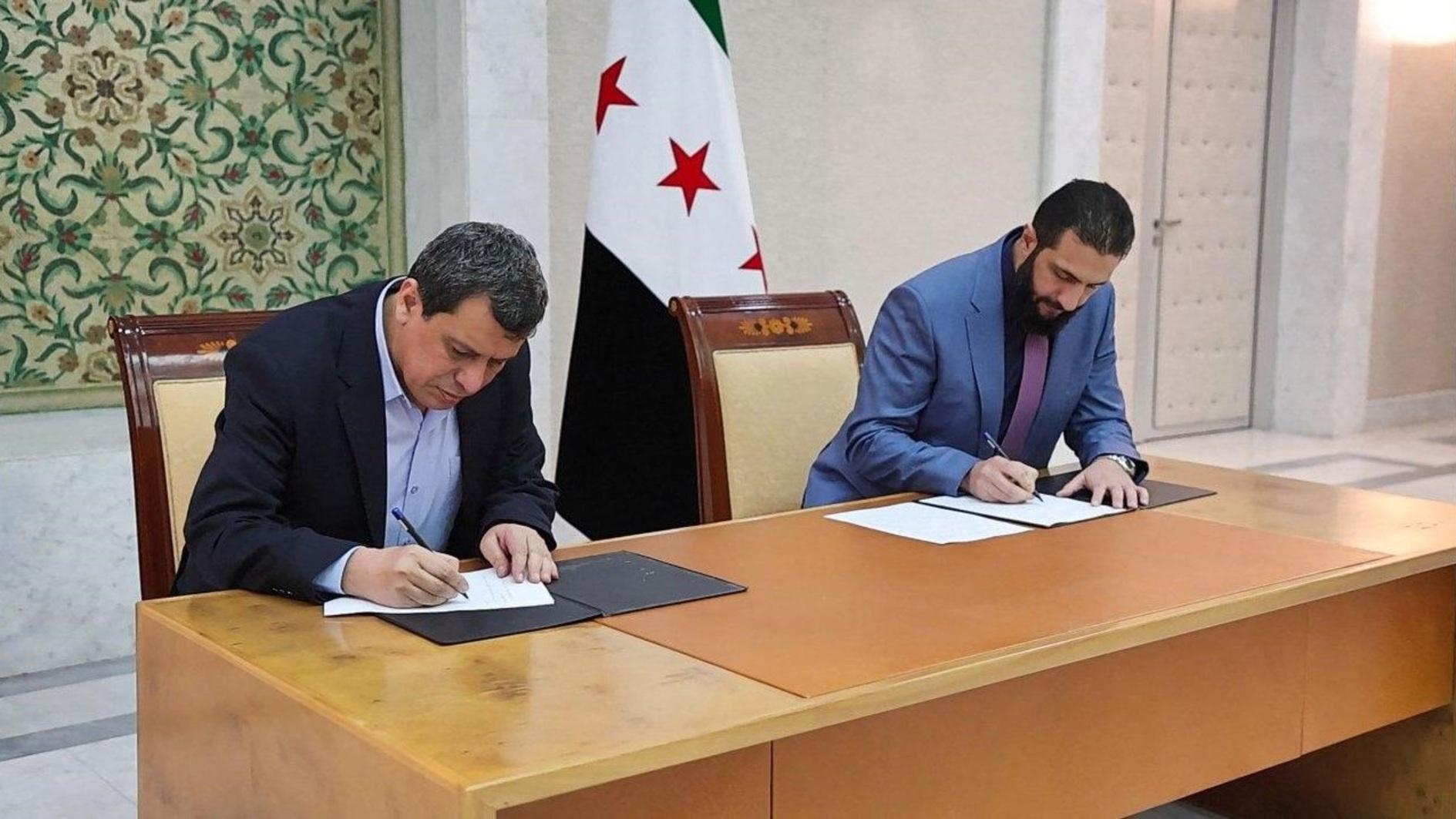
A handout picture released by the official Syrian Arab News Agency (SANA) shows Syria's interim president Ahmed al-Sharaa (R) and SDF commander-in-chief Mazloum Abdi signing an agreement, to integrate the SDF into the state institutions, in the Syrian capital Damascus on March 10, 2025.
The Syrian government’s landmark agreement with the Syrian Democratic Forces (SDF) in the country’s northeast, dominated by the YPG terrorist organization, marks a significant milestone for national unity and a critical step towards rejecting division.
Announced by the Syrian presidency on March 10, the agreement represents the beginning of a process that emphasizes Syria’s territorial integrity and rejects fragmentation. The deal is also a major breakthrough that would bring most of Syria under the control of the government.
YPG is the Syrian offshoot of the PKK terrorist organization.
The deal, signed on March 10 by interim President Ahmad al-Sharaa and Mazloum Abdi, the commander of the SDF, is viewed as a breakthrough in reconciling the country’s longstanding internal divisions.
The agreement has also been welcomed by regional players, with Qatar, Saudi Arabia and Kuwait expressing support for the deal.
The eight-point agreement includes several significant provisions.
The first guarantees equal political representation and participation for all Syrians based on merit, regardless of religious or ethnic background.
The second recognizes the Kurdish community as an integral part of Syria and ensures its constitutional rights.
The third provision calls for a nationwide ceasefire across all Syrian territories.
The fourth, reportedly seen as a critical point by the Turkish government, stipulates the integration of all civil and military institutions in northeastern Syria under state control, including border crossings, airports and oil fields.
The fifth provision ensures the return of all displaced Syrians to their homes under state protection, while the sixth supports Syria in combating remnants of Bashar al-Assad’s forces and other threats to its security and unity.
The seventh rejects calls for division, hate speech and attempts to incite discord.
The final provision establishes implementation committees tasked with enforcing the agreement by the end of the year.
Türkiye, the U.S., and the EU recognize PKK as a terrorist organization, the YPG is considered its Syrian branch and similarly listed as a terrorist group by Türkiye as its Syrian offshoot.
No official statement has been made by Türkiye regarding the agreement, but Turkish media sources suggest a cautious optimism, tempered by concerns about its practical implementation.
“The general mood in Ankara is one of cautious optimism,” CNN Türk’s Ankara correspondent stated.
“Reaching an agreement is certainly important, but Türkiye wants to see how it is implemented.”
Questions remain about whether the parties will adhere to the deal, particularly concerning oil-rich areas now under Syrian state control.
“Will they demand a share of these oil fields, or will they follow instructions from Damascus? These are questions that will only be answered in practice,” the correspondent added.
At least in the initial phase, the current leadership of YPG will be required to leave, media claimed. According to sources. There will also be discussions regarding the departure of non-Syrian fighters and commanders from the country, with steps to be taken in the near future.
Arab media reports suggested that the U.S. played a mediating role in the agreement, with SDF leader Abdi meeting with CENTCOM commander General Michael Kurilla just prior to the talks.
One of the remaining uncertainties is the fate of ISIL members and their families held in YPG-controlled prisons.
The deal came after a unilateral ceasefire announced by PKK on March 1 in line with the historic call by its jailed leader Abdullah Öcalan for the disbandment of the terror organization.